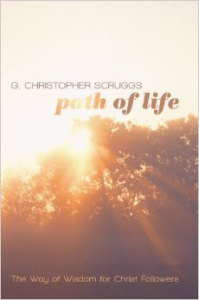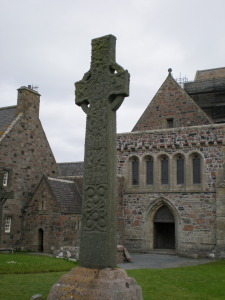 Some men came, bringing to him a paralyzed man, carried by four of them. Since they could not get him to Jesus because of the crowd, they made an opening in the roof above Jesus by digging through it and then lowered the mat the man was lying on. When Jesus saw their faith, he said to the paralyzed man, “Son, your sins are forgiven.” Now some teachers of the law were sitting there, thinking to themselves, “Why does this fellow talk like that? He’s blaspheming! Who can forgive sins but God alone?” Immediately Jesus knew in his spirit that this was what they were thinking in their hearts, and he said to them, “Why are you thinking these things? Which is easier: to say to this paralyzed man, ‘Your sins are forgiven,’ or to say, ‘Get up, take your mat and walk’? But I want you to know that the Son of Man has authority on earth to forgive sins.” So he said to the man, “I tell you, get up, take your mat and go home.” He got up, took his mat and walked out in full view of them all. This amazed everyone and they praised God, saying, “We have never seen anything like this!” (Mark 2:3-12).
Some men came, bringing to him a paralyzed man, carried by four of them. Since they could not get him to Jesus because of the crowd, they made an opening in the roof above Jesus by digging through it and then lowered the mat the man was lying on. When Jesus saw their faith, he said to the paralyzed man, “Son, your sins are forgiven.” Now some teachers of the law were sitting there, thinking to themselves, “Why does this fellow talk like that? He’s blaspheming! Who can forgive sins but God alone?” Immediately Jesus knew in his spirit that this was what they were thinking in their hearts, and he said to them, “Why are you thinking these things? Which is easier: to say to this paralyzed man, ‘Your sins are forgiven,’ or to say, ‘Get up, take your mat and walk’? But I want you to know that the Son of Man has authority on earth to forgive sins.” So he said to the man, “I tell you, get up, take your mat and go home.” He got up, took his mat and walked out in full view of them all. This amazed everyone and they praised God, saying, “We have never seen anything like this!” (Mark 2:3-12).
Most Christians remember a time when they did something wrong, something that involved sin, when they experienced a kind of new life when they asked for forgiveness. Forgiveness is central to the Christian experience of God’s grace. Last week, we talked about the fact that Jesus came proclaiming the Kingdom of God. Near the end of the sermon, we were reminded that Jesus explained that the way we enter the kingdom of God is to repent, believe, and receive the Holy Spirit (Mark 1:15). This repentance is an act of turning away from our sins and receiving the forgiveness of God.
Friday December 5th was a First Friday Prayer Day. There was also a Prayer Vigil at the House of Prayer in Memphis that Kathy and I attended with Don Kerns, who leads our Arlington congregation. This particular prayer vigil was held to celebrate the anniversaries of the Renewal Weekends our congregation helped sponsor in West Memphis, Arkansas and Arlington, Tennessee. While we were there, Don shared some of the things that have happened in Arlington since the vigil. One story he told was especially meaningful. One Sunday this past year while Don was preaching a man came into the church, came down to the front row, and began to mutter and pray. After interrupting the service a couple of times and being assured that the congregation wanted to help him, he got up and left. Several of the men followed him outside and convinced him to come with them to the fellowship hall. For those of you who have not been to Arlington, there is no door between the sanctuary and the Fellowship Hall, just a hallway. The congregation could hear the noise of the conversation. The story is complicated, but the person was an alcoholic and felt that he had done things that could not be forgiven. Don and the men of the church assured him that he could be forgiven, and they began working with the man. Today, he is sober.
The Story of the Man with Friends of Faith
 Like most people of my generation, I have a memory of a Sunday School picture of this story used as a teaching aid when we were children. In the picture, Jesus stands in a home teaching. Above Jesus, you can see that some men have created a hole in the flat roof of a Palestinian home and are lowering a friend to the feet of Jesus. In the picture, Jesus is beginning a conversation with the man. The story goes like this: Jesus was teaching in Capernaum, where he had a home. When the people of the village learned that Jesus was back, they gathered to hear him preach. Apparently, he had made a local reputation by his first sermons, exorcisms, and healings.
Like most people of my generation, I have a memory of a Sunday School picture of this story used as a teaching aid when we were children. In the picture, Jesus stands in a home teaching. Above Jesus, you can see that some men have created a hole in the flat roof of a Palestinian home and are lowering a friend to the feet of Jesus. In the picture, Jesus is beginning a conversation with the man. The story goes like this: Jesus was teaching in Capernaum, where he had a home. When the people of the village learned that Jesus was back, they gathered to hear him preach. Apparently, he had made a local reputation by his first sermons, exorcisms, and healings.
Some men of the area had a friend who was paralyzed. They decided to bring him to Jesus, but they could not get into the tiny home. Therefore, they walked up on the roof. This may seem odd to us, but many homes in Jesus’ day had steps to the roof, and people often slept or relaxed on the roof during the hot summer months. These flat roofs usually consisted of beams, with brush laid between them, and the entire thing covered with mud, something like what we would call “adobe.” It was not difficult to dig a hole in such a roof. [1] This is exactly what the men did. Then, they lowered the man to the feet of Jesus. When Jesus saw the faith of the man’s friends, Jesus said to the man, “Your sins are forgiven” (Mark 2:6).
This was disturbing to the religious professionals who were present. According to Jewish law, only God could forgive sins. Jesus was a traveling, itinerant rabbi, not even a priest or scribe or Pharisee. Clearly, he should not be forgiving sins. They began to accuse him of blasphemy in their minds. Jesus realized what they were thinking, and asked a question, “What is harder to do forgive a person’s sins or heal the person?” Obviously, from a human point of view it is easier to forgive sins. No special power is needed to say, “I forgive you.”
In order to prove that he has the power of God, Jesus said to the man, “Get up, take up your mat, and go home” (v. 11), and that is exactly what the man did. Everyone was amazed because Jesus demonstrated both wisdom, the power of God to forgive, and healing power they felt came from God alone.
The Center of Christian Faith
 In this story, Mark brings us to the center of Christian faith: In Jesus, God came to forgive sinners. Just a few verses later, in another confrontation at Levi’s house, when the teachers of the law see Jesus eating and drinking with sinners and complain, Jesus says, “It is not the healthy who need a doctor, but the sick. I have not come to call the righteous, but sinners” (v. 17). Paul, in reflecting on this says the following: “Here is a trustworthy saying, Christ came into the world to forgive sinners of whom I am the worst” (1 Timothy 1:15). Over and over again in Scripture, Jesus forgives sins.
In this story, Mark brings us to the center of Christian faith: In Jesus, God came to forgive sinners. Just a few verses later, in another confrontation at Levi’s house, when the teachers of the law see Jesus eating and drinking with sinners and complain, Jesus says, “It is not the healthy who need a doctor, but the sick. I have not come to call the righteous, but sinners” (v. 17). Paul, in reflecting on this says the following: “Here is a trustworthy saying, Christ came into the world to forgive sinners of whom I am the worst” (1 Timothy 1:15). Over and over again in Scripture, Jesus forgives sins.
Early on, the Church Fathers determined that the revelation of Christ, and the writings of the New Testament did not invalidate the teachings and laws of the Old Testament. They did not abrogate the moral law. They did not create a situation in which sin did not matter or was not punished. [2] What Christianity added was the belief that we are not trapped in our sins, nor do we need to live with the shame and guilt of our sins, nor do we have to engage in constant, repetitive sacrifice for our sins. They can be forgiven—and Jesus came to reveal and make perfect that forgiveness.
Every so often someone comes to see a pastor and confesses some sin which they have committed, which they have confessed to God, and which they have lived beyond by a changed life. However, they cannot forgive themselves for what they have done. They just cannot believe that God could or would forgive this particular sin. When that happens, it is important to remind them that God promises to forgive our sins if we confess them, ask for forgiveness, and turn, or repent, and live the New Life Christ offers us.
This offer of forgiveness through the sacrificial death of a Savior may not seem logical to us; but it is evidence of a wisdom and logic deeper than human wisdom. It is a reflection of what C. S. Lewis calls, the “deeper magic.” [3] The Apostle Paul calls it the wisdom of God, which the world calls foolishness. He puts it this way:
Has not God made foolish the wisdom of the world? For since in the wisdom of God the world through its wisdom did not know him, God was pleased through the foolishness of what was preached to save those who believe. Jews demand signs and Greeks look for wisdom, but we preach Christ crucified: a stumbling block to Jews and foolishness to Gentiles, but to those whom God has called, both Jews and Greeks, Christ the power of God and the wisdom of God. For the foolishness of God is wiser than human wisdom, and the weakness of God is stronger than human strength (1 Corinthians 1:20-25).
The Suffering Servant
 Nevertheless, what bothers people most is the notion that our forgiveness is free. Sometimes when I talk to folks about this I like to say, “Your forgiveness is free; but it is not cheap.” There was a price to be paid far greater than our own amends and the self-control it has taken us to change our lifestyle. God himself in the person of the Word Made Flesh, Jesus of Nazareth, the Messiah, or Christ paid the price.
Nevertheless, what bothers people most is the notion that our forgiveness is free. Sometimes when I talk to folks about this I like to say, “Your forgiveness is free; but it is not cheap.” There was a price to be paid far greater than our own amends and the self-control it has taken us to change our lifestyle. God himself in the person of the Word Made Flesh, Jesus of Nazareth, the Messiah, or Christ paid the price.
In Isaiah, the prophet, looking forward to the Messiah, describes him like this:
He grew up before him like a tender shoot, and like a root out of dry ground. He had no beauty or majesty to attract us to him, nothing in his appearance that we should desire him. He was despised and rejected by mankind, a man of suffering, and familiar with pain. Like one from whom people hide their faces he was despised, and we held him in low esteem. Surely he took up our pain and bore our suffering, yet we considered him punished by God, stricken by him, and afflicted. But he was pierced for our transgressions, he was crushed for our iniquities; the punishment that brought us peace was on him, and by his wounds we are healed. We all, like sheep, have gone astray, each of us has turned to our own way; and the Lord has laid on him the iniquity of us all (Isaiah 53:2-5).
The vision of Isaiah is a vision of a Messiah that is not a military or political leader. He is not the kind of person that looks good on TV and draws crowds based on charisma. He does not wear expensive suits and spend the weekends at Camp David. He is not what he was expected to be in Jewish folklore—a victorious military commander. He was a person the crowds rejected and misunderstood. He was not handsome, beautiful or majestic. He suffered and was acquainted with grief and suffering. He was not honored for his work. Yet, he was stricken for the transgressions and sins of his people. He was literally crushed by the burden of other people’s sin. He received the punishment he did not deserve—all for those who reject him.
Most people who have seen Mel Gibson’s movie, The Passion of the Christ are struck by the horror of the scourging and crucifixion. [4] We read by his stripes or wounds we are healed; but it is not until we see it that we fully understand the horror of what happened to Jesus on the Cross. This suffering is what Isaiah described. Our forgiveness and salvation may be free to us, but it was not free to God. In Christ, God came into the world to pay the price for our sins and our freedom from their bondage, now and forever.
When Jesus allowed himself to be captured and tried, and then appeared before Pontius Pilate, he delivered himself to the world system of his day and ours, to the “Powers and Principalities of this present dark age” of which Paul later speaks (Ephesians 6:12). The horror of Calvary and what preceded it is the response of the wisdom of God fully present in Christ who gives himself as a sacrifice for our sins in a way that no one could possibly have foreseen. [5]
He Came to Bear a Cross
Kathy and I have recently watched a lot of episodes of a TV show about a burned spy called “Burn Notice.” [6] The “hero,” Michael Weston, is a burned spy who is a kind of modern Robin Hood. Unfortunately, in his anxiety to clear his name, he is forever making mistakes. He betrays his mother, his girl friend, his best friend, his brother, and others. He even gets his brother killed as he tries to recover his job as a spy. After every mistake and betrayal he goes to someone he has wronged and says, “I am sorry.” I don’t think the writers really understood the statement they were making. Michael Weston does not change until the very end of the series. He is just “sorry.” His family and friends, who are often angry with him, being nice people, inevitably forgive him and go on.
 This is not what the Bible means when it talks about repentance and forgiveness. Too many people think forgiveness is just saying “I’m sorry” over and over again to a God who forgives us like a co-dependent parent. This not what the Bible teaches. Our sin is serious. It has serious consequences for us and everyone around us. God came in Jesus and died for our sins sure enough. He came to see that the price for sins was paid in full, and we are debtors to the God who paid the price. If we are sorry and forgiven, then we have an obligation to respond in faith and gratitude to the God of Mercy who has forgiven us. Our response is to live differently than we lived before our forgiveness.
This is not what the Bible means when it talks about repentance and forgiveness. Too many people think forgiveness is just saying “I’m sorry” over and over again to a God who forgives us like a co-dependent parent. This not what the Bible teaches. Our sin is serious. It has serious consequences for us and everyone around us. God came in Jesus and died for our sins sure enough. He came to see that the price for sins was paid in full, and we are debtors to the God who paid the price. If we are sorry and forgiven, then we have an obligation to respond in faith and gratitude to the God of Mercy who has forgiven us. Our response is to live differently than we lived before our forgiveness.
You see, behind the Christmas story is a sober reality: the Babe came to forgive sins—and he came to pay the price for the sins he came to forgive. It was not easy. It was not fun. It involved suffering and sorrow. He came, to forgive our sins, but he also paid the price for them. This reminds us that there is a moral universe in which sin is real and its consequences are real. The Bible teaches that, “the wages of sin is death” (Romans 6:23). The miracle of grace is the way that verse ends: “but the gift of God is eternal life through Jesus Christ our Lord” (Romans 6:23). When we give Christmas presents to our children at Christmas, they are free to them—but they are not free to us. Someone worked long and hard for the presents we receive. While we should celebrate Christmas and be happy in our celebration of our Savior’s birth, our celebration should not blind us to a sober reality: the cute baby in the manger came to be rejected, suffer, and die so that we could have a new life in the midst of the suffering we bring upon ourselves and others.
Copyright 2014, G. Christopher Scruggs, All Rights Reserved
[1] See, William Barclay, “The Gospel of Mark” in The Daily Bible Study Series rev. ed. (Philadelphia, PA: Westminster Press, 1954), 46-47.
[2] In Romans, Paul deals with the notion that the result of grace is that sin is without consequence when he says, “Do we nullify the law by this faith? Not at all! Rather, we uphold the law” (Romans 3:31). In church history, what is at stake in the inclusion of the Jewish scriptures within the Bible is the continuing validity of the Old Testament witness to God and the Torah. Many modern Christians live as if this were not true.
[3] C. S. Lewis, The Lion, the Witch, and the Wardrobe (New York, NY: Collier Books, 1950), 159-160.
[4] The Passion of the Christ, wr. Benedict Fitzgerald & Mel Gibson, dir. Mel Gibson Starring James Patrick “Jim” Caviezel (2004).
[5] See, Westminster Confession of Faith, Chapter 8 which puts it this way, “The Lord Jesus, in His human nature thus united to the divine, was sanctified, and anointed with the Holy Spirit, above measure, having in Him all the treasures of wisdom and knowledge; in whom it pleased the Father that all fullness should dwell; to the end that, being holy, harmless, undefiled, and full of grace and truth, He might be thoroughly furnished to execute the office of a Mediator and Surety. Which office He took not unto Himself, but was thereunto called by His Father, who put all power and judgment into His hand, and gave Him commandment to execute the same. “This office the Lord Jesus did most willingly undertake; which that He might discharge, He was made under the law, and did perfectly fulfill it; endured most grievous torments immediately in His soul, and most painful sufferings in His body; was crucified, and died, was buried, and remained under the power of death, yet saw no corruption. On the third day He arose from the dead, with the same body in which He suffered, with which also he ascended into heaven, and there sits at the right hand of His Father, making intercession, and shall return, to judge men and angels, at the end of the world.
[6] Burn Notice Created by Matt Nix, starring Jeffrey Donovan, Gabrielle Anwar, and Bruce Campbell (2007-2013).



































